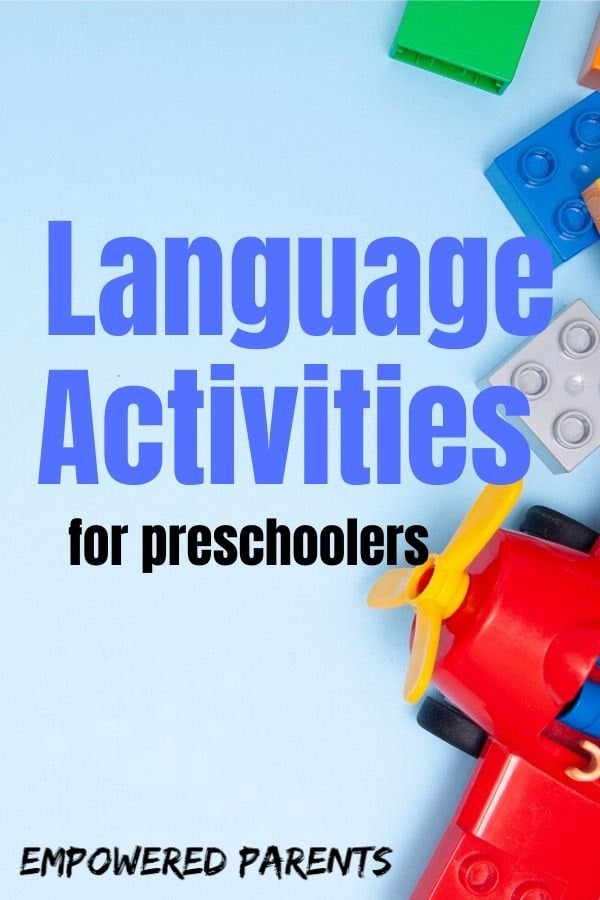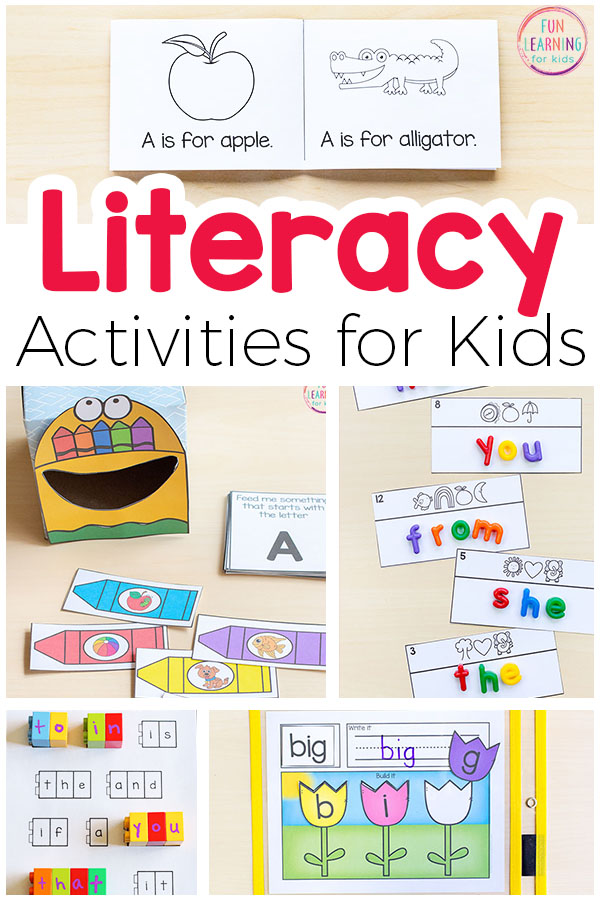
5 Educational Language Activities For Preschoolers
Language development is a remarkable process for parents to witness. From the time our children are infants, we want to capture those precious moments with our cameras. The babbles turn into repetitive syllables, which then turn into words and eventually sentences.

Preschool Ponderings Expressive language activities for preschool
1. Storytelling Books and telling stories are one of the best ways to encourage language. Read age-appropriate stories or just tell the story through the pictures. Start early book experiences with board books and use sensory books to encourage your children to touch and feel items in the pictures.

Simple Early Literacy Activities for Preschool and Kindergarten Kids in
Preschool Language and Literacy Practices. The What Works Clearinghouse reviewed the research on two practices used in center-based settings with 3- to 5-year-old preK children, as well as a number of specific curricula. Positive results are shown for (1) Phonological awareness training and (2) Interactive and dialogic reading.

there are pictures of different activities to do with the letter s and
Literacy skills enable smooth communication between children and the people around them. Preschoolers who can read and write are typically good problem solvers, are independent-minded, and have a strong command of language. Both families and teachers play a significant role in promoting literacy and language development for preschoolers.

Alphabet Sorting Activity Preschool language arts activities
1. Read Aloud 'Arnie the Doughnut' read by Chris O'Dowd This activity is first on the list because it is probably the most important activity to promote literacy skills. Young children learn a lot by listening to stories, looking at picture books, and associating words on paper with spoken language.

11 Preschool Language Development Activities Language development
A few of my favorites are: Where's Spot. Disney Baby First 100 Words. Dear Zoo. Little People Let's Go to School. Little Blue Truck Halloween or Springtime. 3. No-spill bubbles. I want my preschoolers to have as much independence as possible, and if they can hold and blow bubbles themselves, I love that.

15 Interactive Language Activities for Preschoolers Empowered Parents
Simple language activities for preschoolers can be powerful. By encouraging language development through play, you create an environment for language activities to occur naturally. Let's play and build some valuable communication and language skills. Calling All Friends! Let's Play And Build Our Language Skills. Language In Early Childhood

Simple And Powerful Language Activities For Preschoolers Discovery
Overview. Oral language is the foundation of literacy.Pre-kindergarten children are not reading yet, but they are building comprehension skills through listening, the lively back-and-forth of every day conversations, pretend play, and active read alouds where parent and child are having a dialogue about the book.. Parents can develop oral language and comprehension with these activities:

Preschool Literacy Activities for Summer Literacy activities, Summer
Make word and sentence puzzles. This is a great way to make a language game from a text familiar to the children (the book Goodnight, Moon, for example). Write some words, phrases, or sentences from a well-known book or song on index cards. Then cut each card like a puzzle, splitting the words between syllables or between onset and rime (for.

Preschool Language Arts Activities
11 Preschool Language Development Activities June 6, 2018 by Sheryl Cooper Inside: Preschool language development can strengthened by building listening and understanding skills. Each of these 11 activities are fun and playful, while also building children's confidence while using their words.

Blog post. Speech therapy language and literacy activities for
In a colloquial manner, without dominating the discussion, teachers help children develop their language skills by asking thought-provoking questions and introducing new vocabulary through science, art, snacking, and other activities. Children have the opportunity to talk aloud about their favorite books and play stories.

12 Language and literacy activities for preschoolers EduTribe
Language development through play is one of the best ways to young toddlers and preschoolers to learn literacy ideas. Kristina is sharing some language play ideas with us today. Five language play ideas actually. She's one of the moms behind the amazing blog, Toddler Approved. Kristina is the mom to a preschooler and a baby.

Literacy Activities for Kids
Here are 20 language development ideas that ideas you can try! 1. Sing an Alphabet Song There's something about music that makes things stick. There are plenty of songs of catchy songs on YouTube that'll take you through the alphabet with both visual and phonetic elements on display.

Early Literacy Ideas For Preschoolers Maryann Kirby's Reading Worksheets
Here are four key strategies to engage children in thick conversations in English or in their home language: 1. Encourage back-and-forth exchanges. • Tune into children's interests and experiences and talk about them. • Take turns communicating. • Show that you are interested in what they are doing and listening to what they say.

Preschool Alphabet Games Alphabet activities preschool, Alphabet
These are: Phonology: Recognizing and manipulating sounds in words. Syntax: Joining words and phrases to make sentences. Semantics: Understanding the meaning of words and phrases. Morphology: Understanding the smallest parts of words. Pragmatics: The understanding of social cues and context for appropriate language.

Creative and Fun Name Activities Name activities preschool, Name
4. 19 activities to develop effective communication and language provision in your nursery. 4.1. Speech, vocabulary, and discussion. 4.2. Comprehension of vocabulary. 4.3. Senses and concrete experience. The past 2-years have been incredibly challenging, affecting our children the most.